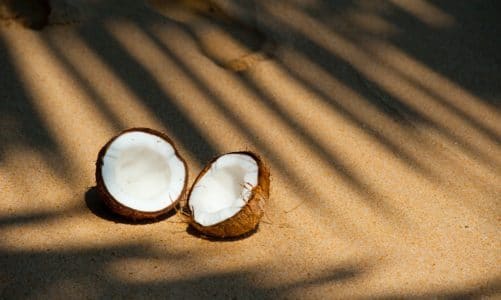This little rock star nutrient packs a punch. You are probably aware of all the good things it can do for you as a powerful antioxidant. Even in small amounts, vitamin C works hard. Some studies have shown it to enhance the immune system, help avoid DNA damage and decrease the risk of chronic diseases too.
There seems to be no shortage of choice on the shelves today and indeed many people are overwhelmed when it comes to choosing the best form of vitamin C for themselves. In this article, we look at the differences between ascorbic acid, mineral ascorbates, organic vitamin C, wholefood vitamin C, vitamin C complex, liposomal vitamin C, and the list goes on. Before we look at 9 forms of vitamin C, first let’s look at what vitamin C is and how it functions in the body.
What are different forms of vitamin C and why is it so important?
Vitamin C is an organic compound. It is also known as s L-ascorbic acid or generally referred to as simply ascorbic acid. It was the Hungarian biochemist and Nobel Laureate Dr. Szent-Gyorgyi, who first isolated ascorbic acid, now known as vitamin C. It is also an essential nutrient that is not produced in our bodies. Most other mammals however are able to produce quite a substantial amount of between 5000 to 10000 mg a day. Primates, certain fruit-eating bats, and guineas pigs are the exception, just like us. It is also interesting to note that animals increase the production of vitamin C in the body in times of stress or illness. Likewise, perhaps we may feel the need to increase our uptake at certain times we experience stress or feel our immunity is low.
We ideally, need to obtain Vitamin C from nutrient-rich wholefood sources or as dietary supplements. The problem is that most of our food sources today have become nutrient-depleted. That perfect-looking pest-resistant carrot you eat today is far less nutritious than the carrot your grandparents ate a few decades ago.
A December 2004 study published in the Journal of the American College of Nutrition, observed the declining nutrient content of 43 vegetables and fruits over the past half-century. The Organic Consumers Association tracks many other studies that indicate the same thing. The typical American diet of processed foods, refined grains, and sugar overload, does not help either. That said, research suggests and it still makes logical sense to aim to get most of your nutrients from food. Therefore it would serve one well to buy organic fruits and vegetables as far as possible, or better yet – grow your own.
If you need to address a Vitamin C deficiency or boost your immune system periodically, through supplementation, choosing a vitamin C form best suited for your needs, will help you reach your health goals faster. This article looks at different forms of vitamin C such as natural, organic, wholefood, liposomal, synthetic, gummies, intravenous, and buffered vitamin C.
Plant sources: a natural form of vitamin C.
Certain botanical sources are rich in vitamin C and you may consider growing this natural form of vitamin C at home including strawberries and peppers. Below you can find a list of the top 10 sources. It might surprise you to see that oranges were left out. Well, it turns out a little berry from the tropics, called Acerola, contains far higher concentrations of vitamin C, in fact, Acerola outshines every other item on the list by far in the amount of vitamin C per measure. The Rose Hip Fruit and the humble guava also make appearances in top positions.
| Description | Measure | Ascorbic acid (mg) |
| Acerola juice, raw | 1.0 cup | 3872 |
| Acerola, (west Indian cherry), raw | 1.0 cup | 1644 |
| Rose Hips, wild | 1 cup | 541 |
| Guavas, common, raw | 1 cup | 376.7 |
| Kiwifruit, green, raw | 1 cup, sliced | 166.9 |
| Orange juice, raw | 1 cup | 124 |
| Pomelo, raw | 1 cup, sections | 115.9 |
| Peppers, hot chili, green, raw | 1 pepper | 109.1 |
| Peppers, jalapeno, raw | 1 cup, sliced | 106.7 |
| Strawberries, raw | 1 cup, halves | 89.4 |
| Mustard spinach, raw | 1 cup, chopped | 195 |
How much vitamin C do I need?
Healthy adults should be able to get their daily recommended allowance (RDA) from natural and organic forms of vitamin C such as citrus fruits, guavas, broccoli, peppers, and leafy green vegetables.
People who have compromised immune systems and smokers may benefit from even higher dosages for additional health benefits,
The Linus Pauling Institute admits that it is currently unknown how much vitamin C is required to achieve cells and tissue saturation in children, older adults, and diseased or stressed individuals.
It however recommends a daily intake of 400 mg/day of vitamin C for generally healthy adults.
What are the benefits of different forms vitamin C?
A quick glance at the general benefits of different forms of vitamin C and you realize why it is such a key nutrient for optimum health. A great immunity booster with antioxidant properties. It not only lowers blood pressure, but aids with iron absorption reducing heart disease, and protecting memory.
- Anti-aging Vitamin C builds super important and youth-enhancing collagen in the body which is crucial to keeping skin firm and supple and bones strong.
- Energy Vitamin C plays a crucial role in the production of L-carnitine, an energy-giving amino acid.
- Stress Resilience Vitamin C produces feel-good dopamine and adrenaline in the nervous system and keeps the adrenal glands in good shape.
- Immunity Vitamin C functions as a strong antioxidant, and also helps fight inflammation, providing protection from the common cold. In higher dosages, it may prevent or treat other more serious health conditions such as cancer, cardiovascular disease, and age-related macular degeneration(AMD).
- Healthy Heart Vitamin C provides cardiovascular protection through its antioxidant properties and its ability to tackle plaque.
Vitamin C is found not only in the blood, but in high concntrations in tissues such as the eye lens, the pituitary, the thymus and the adrenal glands.
Find out which different forms of vitamin C is best for you?
As mentioned earlier, this article discusses 9 different forms of vitamin C and which type is best for you, each with its own advantage. It is interesting to know that all forms of vitamin C have an ascorbate anion. This anion is negatively charged and is the active part. It has the ability to bond with other parts or cations. These cations include minerals such as sodium, magnesium, or potassium. It is these different bonds that result in the different forms of vitamin C supplements.
Speak to your doctor if you have a heart condition or if you are on any medication, as each of these mineral ascorbates has a different impact biologically. The best form of vitamin C for you will also depend on your short and long-term needs.
1. Natural Vitamin C – the best form straight from nature herself.
Not all ascorbic acid is manufactured synthetically. Botanical superfruit sources, like the Acerola cherry and the Camu Camu berry, are natural forms that are super rich in vitamin C. The concentrations are highest when the Acerola cherry is green rather than fully ripe.
The Camu Camu berry from a shrub found in the Amazon rainforest is considered to be the richest fruit in vitamin C content and was traditionally used to promote long life and fight infection. Per 100 grams, the fruit delivers 2500 milligrams of vitamin C. Compared to an orange, that is 30 to 60 times as much goodness!
The Acerola cherry can be eaten raw or cooked and has a sweet taste and fragrance, while the Camu Camu berry is rather tart in flavor.
These superfruits are sold in powder, tablets forms, and as juice. Often bioflavonoids, plant-derived compounds that occur naturally in fruits, veggies, herbs, and dark chocolate, are added to enhance vitamin C action and give the product more antioxidant power.
These natural forms of vitamin C are anti-inflammatory, they help increase memory and focus, tone muscles, improve vision, and are antibacterial and antiviral. Other rich natural sources of vitamin C include guavas, peppers, and strawberries.
What to look for in natural forms of vitamin C
With all the different forms of vitamin C, look out for organic certification and avoid all products with preservatives, artificial flavors, and sweeteners. Natural vitamin C forms with added bioflavonoids are somewhat more expensive than standard ascorbic acid because of the added bioflavonoids. The tea version of Acerola and Rosehips is great. Ideally, choose products that are as close to the real thing as possible.
Natural forms of Vitamin C supplements should be:
- Free from most if not all additives
- 100% organic
- Non GMO
- Sugar free
- Free from harmful contaminants
- Controlled tested
- Close to 100 percent of the Daily Value as possible.
- Ideally third-party certified
- Ideally nutrient potent due to freeze drying and raw extraction
- Contains no synthetic vitamin C
- Pullulan free
2. Wholefood Vitamin C – best form for daily intake.
You’ve heard that saying ‘something is more than the sum of its parts, right? We’ll it seems to be the case with vitamin C too. This is according to wholefood research expert, Dr. Royal Lee who describes vitamins as biological complex systems and not as individual parts. He explains that ascorbic acid is just a fraction of a part of the whole vitamin c complex. A vitamin is, therefore, an enzyme system consisting of the following, namely
- ascorbic acid
- assorted bioflavonoids
- vitamin K
- vitamin J
- vitamin P
- tyrosinase
Respected clinical nutritionist and health researcher Judith DeCava, holds the same view as Dr. Royal Lee. In her book The Real Truth About Vitamins & Antioxidants, she explains that
Natural vitamin C is a complex of compounds, only one of which is ascorbic acid, that works together to deliver a nutritive effect.
Wholefood forms of vitamin C are essentially natural forms of vitamin C derived from plants. In supplement form, whole food sources are available in powder or tablet form. The truth is that most supplements marketed in this form contain isolates that are extracted from the source in a lab for commercial use. These isolates are not really different from the synthetic form. In other words, the body recognizes the isolated form as C6H8O6, which is ascorbic acid any way you look at it.
The best wholefood vitamin C supplement forms involve air-drying the fruits first, followed by water extraction, testing, and encapsulation. Organic fruits and veggies like kale, spinach, pomegranates, and berries are sourced and concentrated to create whole food supplements.
Because these types of vitamin C supplements require a longer process time and are also more labor-intensive, they are usually more pricey. Studies have shown that the digestion of vitamins in whole food form is equivalent to the synthetic form. As a rule of thumb, give your body what it needs in the form of healthy, nutrient-rich food. Consider supplements as a boost or to address a health deficiency.
What to look for in different forms of vitamin C, especially the whole food form.
Whole food extracted vitamin C comes in tablet and powder forms. Look for a good quality sourced whole food product that contains a mix or blend of fruits and veggies. Powder forms can easily be mixed into smoothies or a juice for an early morning pick-me-up or afternoon boost. Pick a whole food supplement that contains organically sourced ingredients that are also non-GMO. Avoid products with fillers, artificial flavors, preservatives, and colorants.
A good whole food Vitamin C supplement should be
- Free from most if not all additives
- USDA organic
- Non GMO
- Sugar free
- Free from harmful contaminants
- Controlled tested
- Close to 100 percent of the Daily Value as possible.
- Ideally third-party certified
- Nutrient potent due to freeze drying and raw extraction
- Not contain synthetic vitamin C
- Pullulan free
3. Vitamin C in organic form – the better and healthier choice.
These days, the word organic used alongside Vitamin C causes a great deal of confusion.
We are told organic vitamin C is our best friend and that it is more powerful than other forms of vitamin C such as regular ascorbic acid. We are told that it can supercharge the immune system simply on the basis of it being organic. What is the truth behind organic vitamin C? Is it all just hype?
In his book, Vitamin C: The Real Story, Dr. Andrew Saul, explains that molecular vitamin C, or C6H8O6, is just that, ascorbic acid. Nothing more and nothing less. Whether the vitamin C is isolated from whole foods, manufactured synthetically, or extracted from a GMO source, should make no difference, right? The end result is always the same, namely ascorbic acid. Just like a carbon or oxygen atom, it cannot be genetically modified.
But when some people look for organic vitamin C commercially, they want to be assured that the molecules were not synthesized from GMO corn, for example, not knowing that it doesn’t really make a difference in the molecular structure of ascorbic acid. Commercially, the organic vitamin C form also refers to organic sources of plants from which vitamin C will be extracted or sourced.
For peace of mind, look for an official USDA organic seal. It may either state 100% organic or just organic, which means the product contains a minimum of 95% organic material. When looking for an organic form of vitamin C supplement, be on the lookout for fillers and other unwelcome ingredients.
Avoid the nasties
In the organic and whole foods supplement market, avoid GMO sourced and non-organic ingredients. The following ingredients are also no-nos:
- Sucrose
- Aspartame
- Sucralose
- Potassium sorbate
- Stearic acid
- Maltodextrin
- Artificial flavors and colors
- Sucralose
- Titanium Dioxide
- Carrageenan
- Magnesium Stearate
- Silica
If conflicting evidence about an ingredient is prevalent in the market and it is hard to get the facts, rather avoid it.
Natural and wholefood forms of vitamin C supplements
OUR TOP PICKS
VIVA NATURALS Vitamin C
1000mg (250 Capsules) | Non-GMO Vitamin C with Citrus Bioflavonoids & Rose Hips
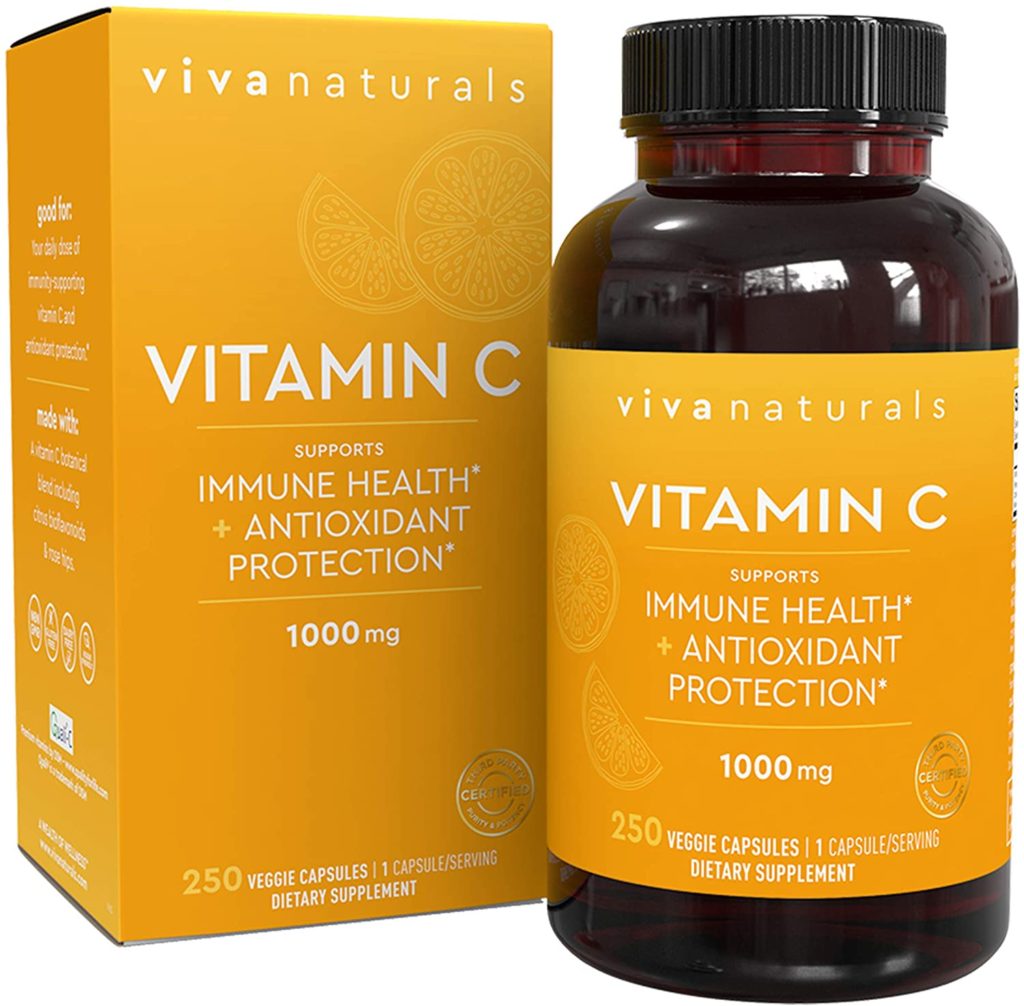
PURE ORGANIC Vitamin C from Acerola berries
100 Capsules | Non-GMO | Gluten-Free | Natural Extract
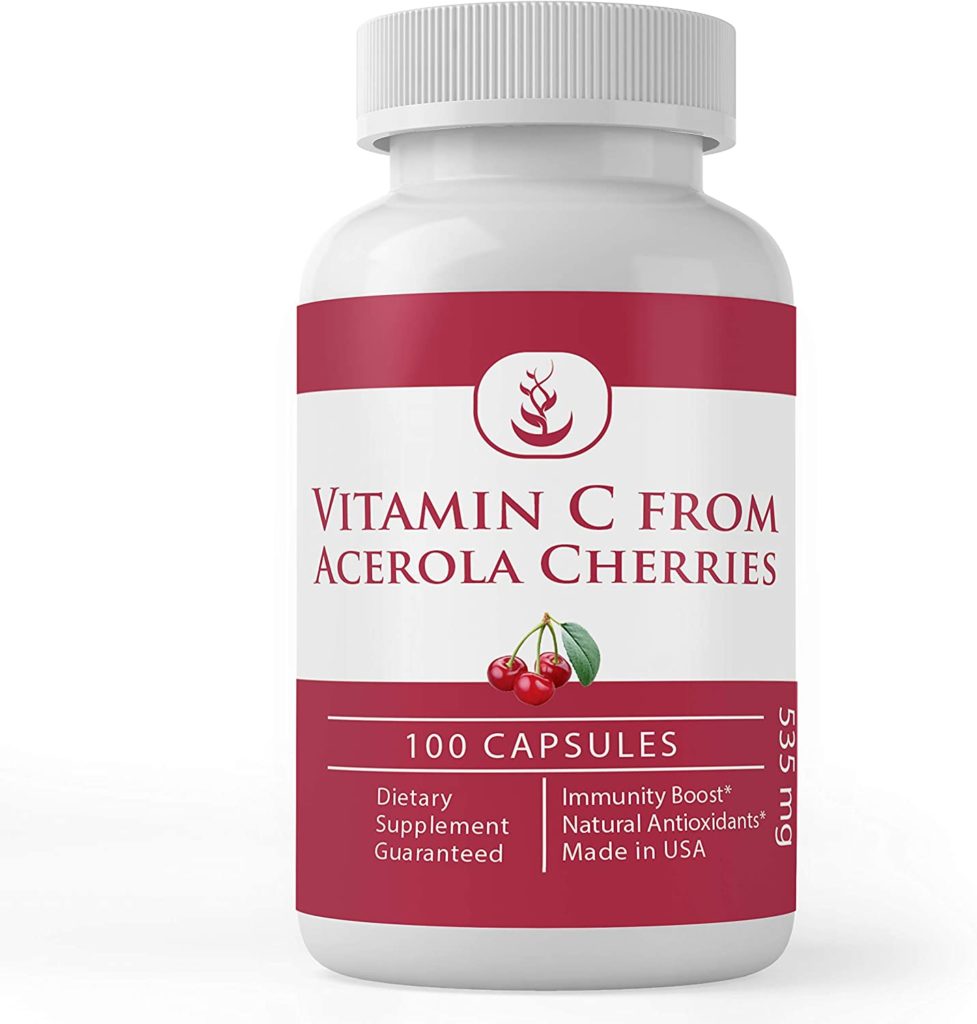
GLOBAL HEALING USDA Organic Vitamin C Drops
500mg | Liquid Vitamin C Whole Plant-Based | Collagen | For Adults | 2 Oz

FGO Organic Rosehips
Organic Rosehips | Cut & Sifted | Raw from Chile | 16oz/453g
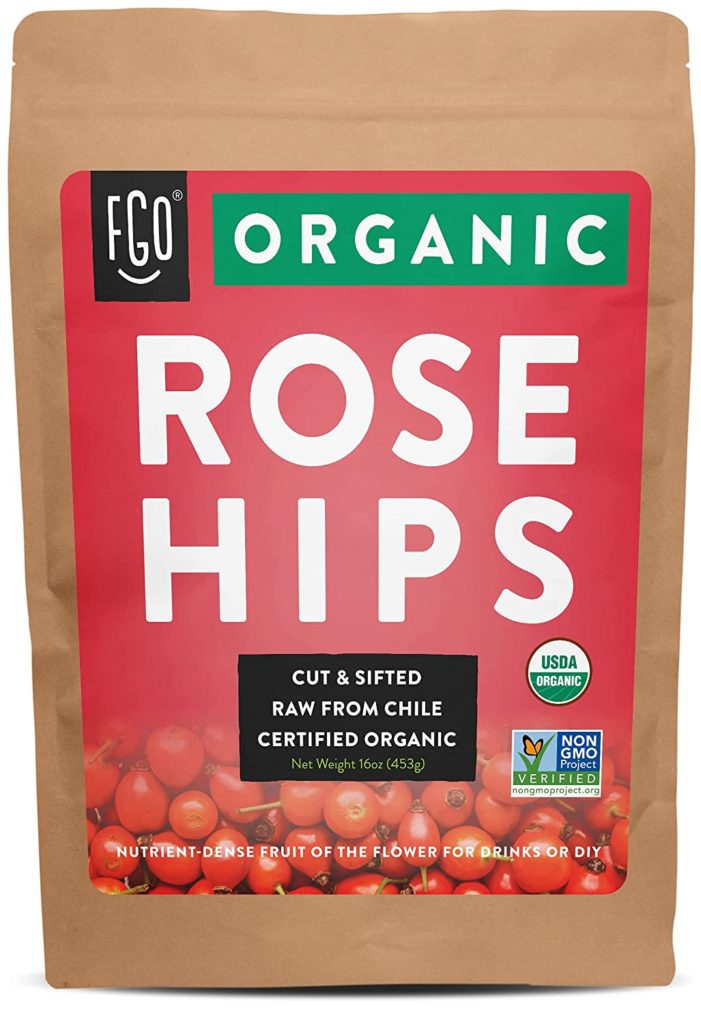
EARTHBORN Natural vitamin C from Acerola Cherry
200 Capsules | 535mg Serving | High Potency
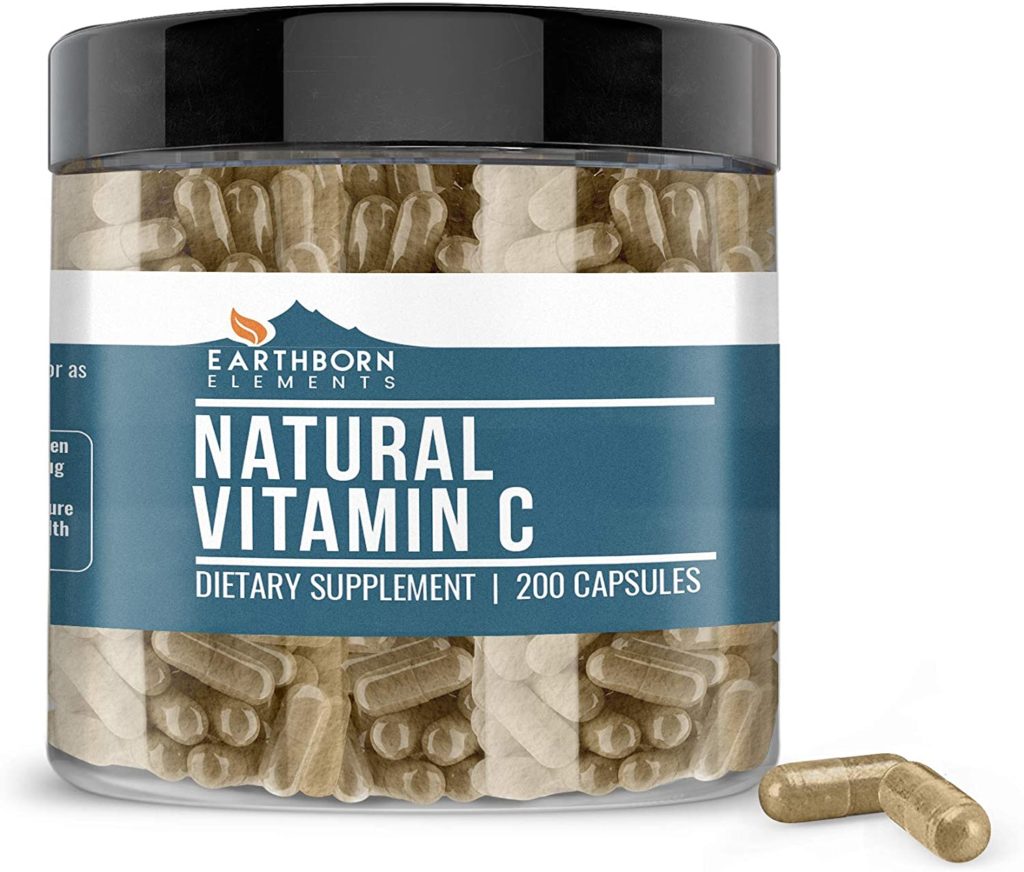
NUTRIGOLD Vitamin C made with Organic Fruits
240 mg | 90 Capsules | Corn-free | Certified Organic | Vegan | Kosher | Non-GMO
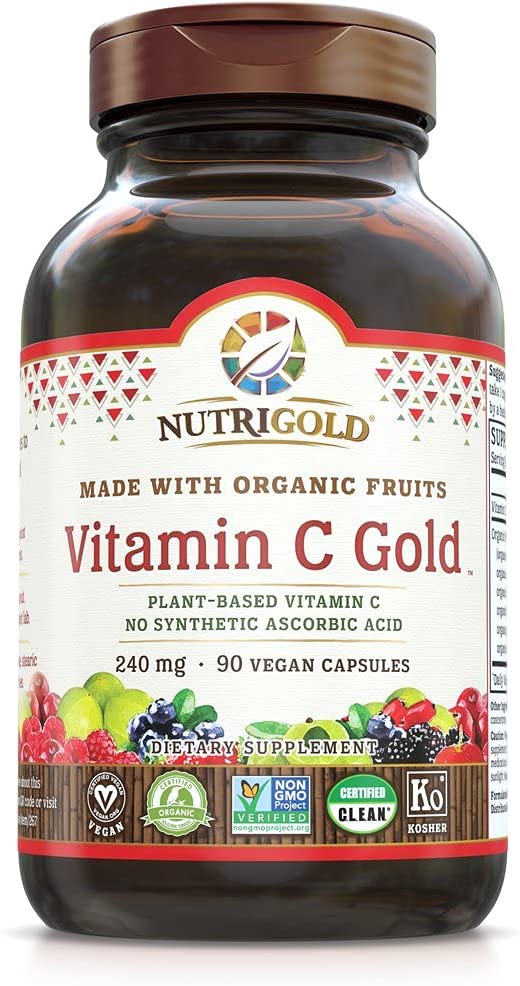
PURE SYNERGY Pure Radiance C
4 oz Powder | USDA Organic | Non-GMO | Vegan | 100% Natural Vitamin C with Organic Camu Camu Extract
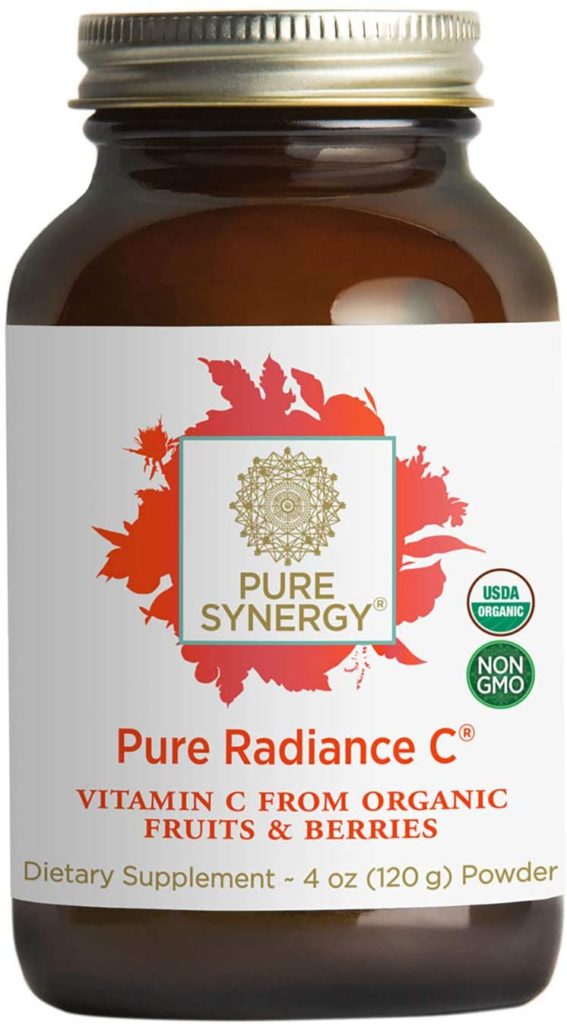
MICROINGREDIENTS Pure Acerola Cherry Powder Organic
Natural and Organic Vitamin C Powder | 8 Ounce | Great in Beverage, Smoothie & Drinks | Vegan Friendly
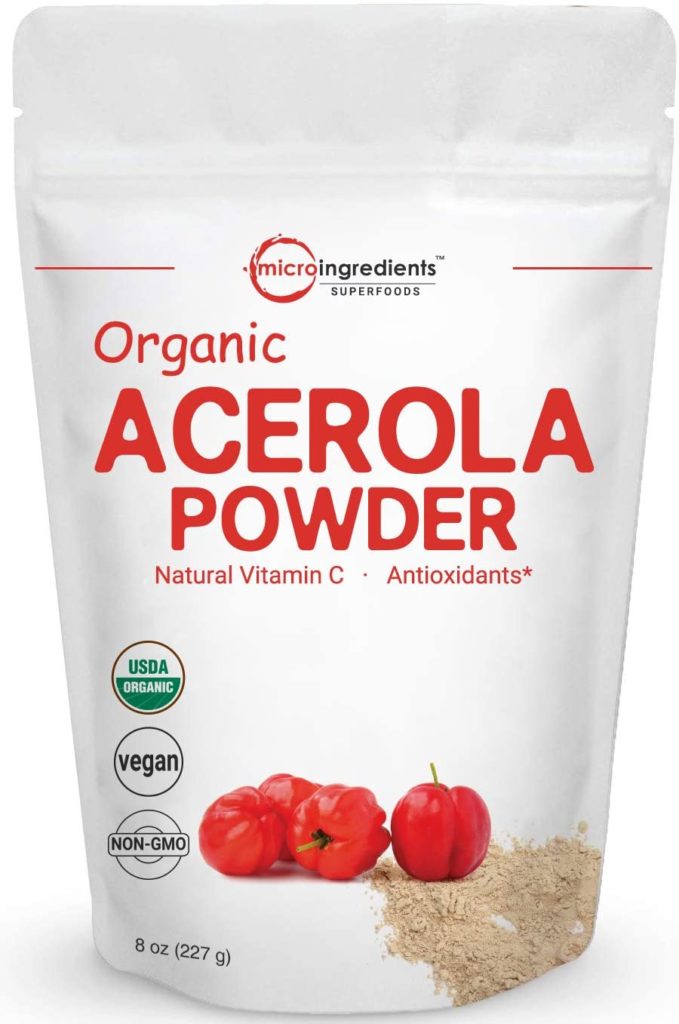
4. Synthetic – best form of vitamin C for faster results
Synthetic vitamin C is produced by the big players on the market today, such as Roche, Merck, and the China Pharmaceutical Group Ltd of the People’s Republic of China.
Basically, there are two routes of production that involve fermentation and chemical processes. Since the 1930’s the Reichstein method has used a single pre-fermentation process followed by a chemical route. Later a more modern method, developed in China would replace some of the later chemical stages with additional fermentation. Both of these routes are able to produce a yield of about 60% of vitamin C from glucose.
The ascorbic acid produced from glucose is vitamin C and is chemically no different from the vitamin C extracted from whole food sources also in a lab. Many vitamin C supplements on the market derived from whole food sources are in fact created in a lab. The source might look different but the end result is the same, namely ascorbic acid.
Other types of vitamin C are mineral forms and are called mineral ascorbates. It is the combination of a mineral and ascorbate. Ascorbate refers to anions (negatively charged ions) formed from ascorbic acid. Sodium ascorbate is one of the best ways to digest vitamin C because it is less acidic and easier for those with sensitive digestive systems. People with heart problems and high blood pressure should watch their sodium and potassium intake. Other forms of mineral ascorbates include Calcium ascorbate, Potassium ascorbate, Magnesium ascorbate, and Zinc ascorbate.
According to scientist Linus Pauling, plain ascorbic acid is still the best form of vitamin C if acidity is not an issue. It is inexpensive and readily available. You should get about 1000 mg of vitamin C per quarter teaspoon from a good product.
If you looking for a good synthetic form of ascorbic acid, consider Quali-C which is a high-grade, super soluble form of vitamin C manufactured in Scotland.
5. Buffered – best form of vitamin C for sensitive stomachs
Generally, vitamin C is well tolerated even at much higher than usual dosages. Even though it is acidic it is far less so than the citric acid found in lemons or limes for example. In fact, it is a weak acid even compared to vinegar.
Even though the body actively and constantly regulates pH in the bloodstream, some people might still experience an uncomfortable stomach. Taking ascorbic acid in powder rather than tablet form may help ease discomfort for those with sensitive stomachs.
Some mineral ascorbates such as sodium ascorbate, magnesium ascorbate, potassium ascorbate, and calcium ascorbate may be better tolerated. If you are on medication or have a heart problem, check with your doctor which mineral ascorbate is best. If you have elevated potassium levels you do not want to be taking potassium ascorbate for example. Also note that these buffered forms might not be as effective when used as a treatment for colds or flu, as plain ascorbate acid might be.
TIP: Buffer ascorbic acid with a small amount of sodium bicarbonate. The fizzing releases sodium that neutralizes the acidity.
OUR TOP CHOICE for a Buffered Vitamin C
C-SALTS Buffered Vitamin C
Gentle on the stomach | Non-GMO | Corn Free
High Dose 1000mg – 4000mg | 26oz
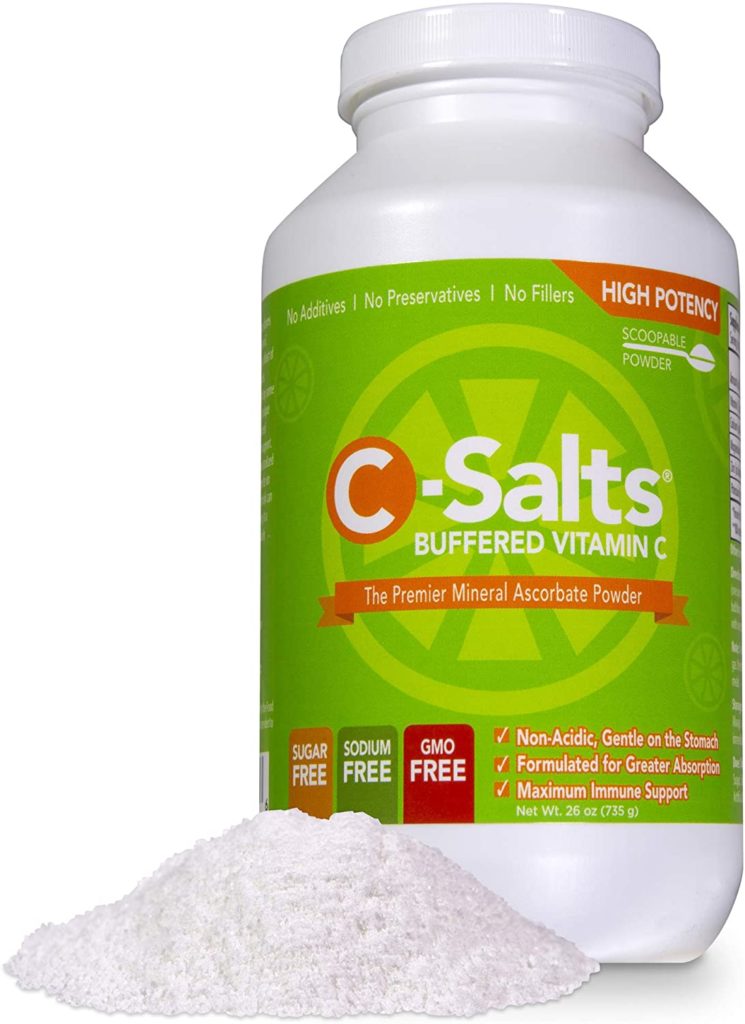
6. Liposomal vitamin C – best type for faster absorption
This new kid on the block promises faster delivery into the bloodstream and also better results than ascorbic acid in its conventional form because it bypasses the digestive system. The secret lies in something called Liposomes, the tiny microscopic spheres which facilitate faster intracellular uptake of their contents. Liposomal vitamin c is purported to be 5 to 10 times more bioavailable than plain vitamin C, but also more pricey. It comes in both tablet and powder form.
Because this form of vitamin C is still new and exciting claims are made, tread carefully as there will be many companies jumping on the bandwagon to claim a spot to sell you a half-baked liposomal product or something that pretends to be the best on the market.
A good Liposomal vitamin C should have
- High quality ingredients
- High concentration of nano particles
- Refined phosphatidylcholine
OUR TOP CHOICE for a Liposomal form of Vitamin C
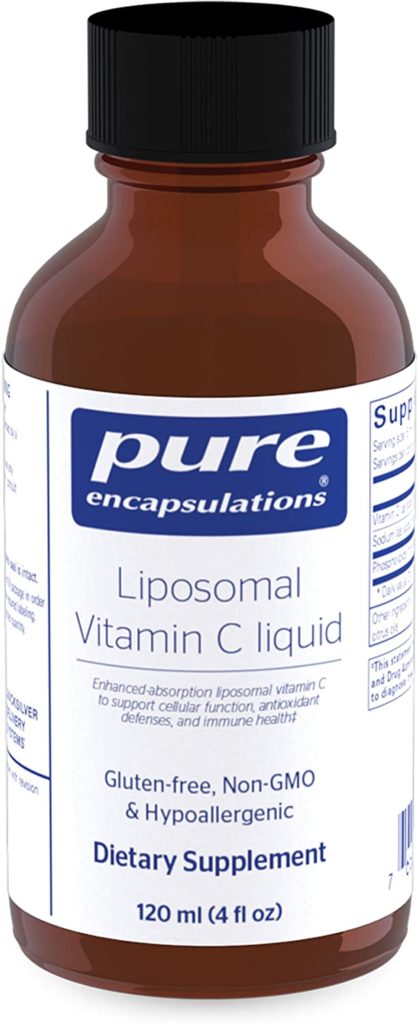
7. Vit C Gummies – best vitamin C supplement form for kids
Gummies are a great vitamin C form for kids. Of all the different forms of vitamin C, these are usually the ones containing a lot of sugar. Ideally, toddlers and kids should get their daily vitamin C requirements through a balanced and healthy diet that includes fresh fruits and leafy green vegetables. Today this is quite challenging given the demands of modern life for both parents and children. Pediatricians may therefore recommend vitamin C on its own or as part of a multivitamin.
Kids who may usually need to supplement include those who eat too little and irregularly, have digestive issues, or medical conditions, or who follow a vegan diet.
The Institute of Medicine’s daily recommended allowance (RDA) for kids and teens are as follows:
1 to 3 years – 15 mg
4 to 8 years – 25 mg,
9 to 13 years – 45 mg
14 to 18 years – 65 to 75 mg
Important however to take care of their oral hygiene since these chewy gummies contain sugar too. Non-acidic chewable vitamin C tabs are also better for young teeth.
8. Intravenous vitamin C – the best form for higher dosages
What is all the fuss about you might be asking, when clinics and boutique vitamin drip shops all around the world are popping up, promising revitalization, a boosted immune system, youthful skin or restored energy levels with IV drips.
Popular with many celebs and supermodels as a pick-me-up before special events or touted as hangover cures for others. Even house call services are offered. You may have read or not about Kendall Jenner’s hospitalization after a vitamin IV drip she received caused a bad reaction. All the more reason to treat it as more than just a quick fix and find a reputable clinic and licensed medical professional with experience in IV administration and the right protocols.
A full evaluation should usually be done prior to an intravenous vitamin C infusion which includes a test for adequate levels of the enzyme G-6-PD (Glucose-6-Phosphate-Dehydrogenase). Deficiency may mean red blood cell death (hemolytic anemia). If you are one of the only 5 – 15 % of the population with this deficiency special monitoring and a revised protocol would need to be followed.
So how does it work? Well, when Vitamin C is delivered intravenously, it bypasses the stomach and gut. High concentrations of it in the blood can only be reached through intravenous delivery and not through oral intake. Dosages vary across clinics, some offering dosages between 10 grams (10 000mg) and 20 grams (20 000 mg) and others even higher.
This form of liquid vitamin C can be used as a proactive protocol to maintain optimum wellness and also to treat more chronic conditions. The therapeutic benefits of Intravenous vitamin C were also explored by scientist Linus Pauling.
Benefits IV infusions:
- Revitalizing therapy
- Boosts Immunity
- Aids recovery
- Helps in the treatment of cancer
- Helps alleviate chemo side-effects
Note of caution that some vitamins are just not meant to be mixed in a cocktail with others and there is not a one size fits all. Everyone is different. This discussion falls outside the scope of this article of course.
Final thoughts to find the best form of vitamin C
Getting your daily dose from any of the above-mentioned 9 forms of vitamin C is important, but just as important is where the ingredients are sourced from. Many natural plant sources today lack the nutrients our bodies need for optimum health. Buying organic forms is better, but comes at a premium and even then it involves trust. Certified Organic does not mean non-GMO. Why not try producing your own supply of vitamin C at home?
For this reason, many people are looking at a highly competitive and saturated supplement market to fill the gap. Many consumers are unaware of the dangers that lurk when venturing into unchartered waters and do not have enough knowledge to make better decisions when choosing a product.
Don’t just buy. Research the brand, product, and ingredients. Get label savvy. Try IS IT BAD FOR YOU, a great tool in your quest for answers about certain ingredients and nutrients. Another great resource is Nutritionfacts.
For many people who have sensitive stomach issues, taking vitamin c in liposomal form is a good alternative. As this is a relatively new market still, it is best to remain cautious. Not with the science mind you, but what are pushed scrupulously into the market. Many of these products contain questionable preservatives or fillers. Others have potassium sorbate (preservative) included inside the nano-shell structure. Yet others are produced from soy.
All in all, the motto should be ‘keep it simple’. Don’t fall for Vitamin C supplements that contain too many ingredients. Vitamin C is still just plain Ascorbic acid and when you get it from the whole food source, you get all the enzymes that work together too. There are many different forms of vitamin C for everyone depending on your needs.
A pediatrician will be able to advise you on dosage depending on your child’s needs. If you or your child have, allergies, sensitivities, diabetes, a heart condition, or any other chronic health, consult a health expert that can advise you on the intake of vitamin C. It is also best to consult a health practitioner when you intend to take dosages much higher than the daily recommended allowance because the risk of side effects might increase.
If you enjoyed this article, you might like these too:
What is Quali-C vitamin C and which brands to choose?
Which essential oil contains vitamin C?
The 6 best vitamin C face washes for brighter skin.
What are the best organic vitamin C supplements for babies?
How to make vitamin C taste better.
Disclaimer and cautionary note: The contents of this website are for informational and entertainment purposes only and do not constitute medical advice; the content is not intended to be a substitute for professional medical advice, diagnosis, or treatment. Always seek the advice of your dermatologist, physician, with any questions you may have regarding any skin conditions or other medical conditions or when considering taking a dietary supplement orally or intravenously.
Affiliate Disclosure
Some of the links that appear on this site are affiliate links. We may receive a small commission when you make a purchase. These commissions help to improve this site and to fund further research. No product will be recommended that we don’t believe in.

